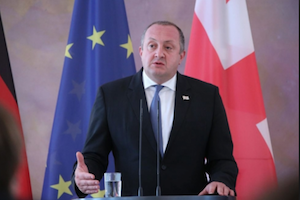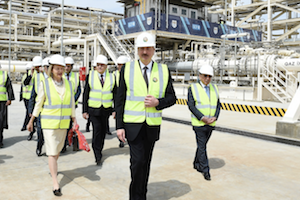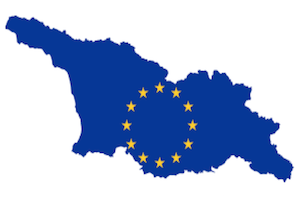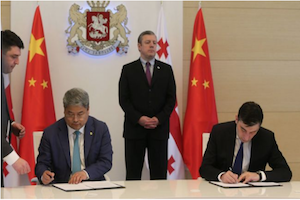Volatile Migration Challenges Georgia's Visa-Free Travel to the EU
By Casper Wuite
November 12, 2018, the CACI Analyst
Since Georgian nationals were granted visa-free travel to the EU in March 2017, there has been a significant increase in the number of Georgian asylum applications. While the European Commission has been mildly optimistic so far in its assessment of the visa free travel regime, analysis shows that the trend in asylum applications is much more volatile than acknowledged by Georgia and the EU and could threaten visa free travel. Suspension of visa free travel is unlikely in the short term, but countries with high numbers of Georgian immigrants such as Germany and Italy face a mounting populist tide that could force both countries to trigger the visa suspension mechanism.

Georgia's Far Right and Mainstream Politics: Lessons from the EU
By Tomáš Baranec
August 28, 2018, the CACI Analyst
In mid-May, Tbilisi once again witnessed mass demonstrations led by various liberal groups. This time the unrest was fueled by a harsh police operation against alleged drug trafficking in two popular clubs in Tbilisi: Café Gallery and Bassiani. An otherwise quite common sight in the Georgian capital was dramatized by a massive opposing rally led by several Georgian far-right groups. Although not the first such demonstration, this rally seemingly initiated a process of consolidation and unification of Georgia’s political far-right. This process could lead to a rise of far-right, nativist and anti-EU narratives in Georgia’s political mainstream.

New Southern Gas Corridor Project Will Intensify the Regional Pipeline Race
By Fuad Shahbazov
June 28, 2018, the CACI Analyst
On May 29, Azerbaijan’s President Ilham Aliyev officially inaugurated the first phase of the long-awaited flagship project Southern Gas Corridor (SGC), through which Caspian natural gas from the Shah-Deniz II field will be transported to Europe. The new project consists of several pipeline networks that pass through Georgia and Turkey (via the Trans-Anatolian Pipeline, TANAP) and further through Greece, Albania and Italy (via the Trans-Adriatic Pipeline, TAP). As Shah Deniz Stage 2 is implemented, gas production will increase from 9 to 25 billion cubic meters (bcm) per year.

What Will Brexit Mean for Georgia?
By Casper Wuite
May 10, 2018, the CACI Analyst
EU neighboring countries such as Georgia are carefully monitoring the Brexit negotiations. Georgian government officials worry that Brexit will further delay Georgia’s Euro-Atlantic integration. Under a post-Brexit French-German leadership, few expect significant changes to the EU’s neighborhood and enlargement policy. The lack of new incentives short of a membership perspective will be a setback for Tbilisi, which is keen to determine new perspectives on further integration. To advance its Euro-Atlantic integration it should temper its expectations and focus on implementing reforms associated with the AA/DCFTA, exploring defense and security co-operation, and engage with the public on the European Union and its policies.

Growing Chinese Interests in Georgia
By Emil Avdaliani
March 15, 2018, the CACI Analyst
The Free Trade Agreement between China and Georgia, signed in 2017, came into force on January 1. This will allow Georgian products free access to one of the world’s largest consumer markets, and will free approximately 94 percent of Georgian products from customs taxes. The growth of China’s economic interests has increased Georgia’s hope of playing a role in in Beijing’s Belt and Road Initiative (BRI). By extension, China’s increasing presence in the South Caucasus raises questions regarding the compatibility of Beijing’s interests with those of the region’s traditional hegemon, Russia.



